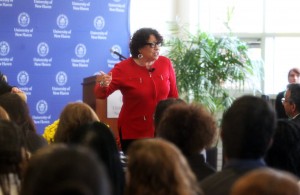By Melissa Scott
Contributing Writer
[email protected]
Sonia Sotomayor visited the University of New Haven campus for the UNH Legal Society’s event, “A Conversation with Justice Sonia Sotomayor,” on Friday Oct. 24.

(UNH photo obtained via Facebook)
A select number of tickets were available to students and faculty, who were to pick up tickets before 1 p.m. from South Campus on Friday in order to attend the event.
The conversation was held in the Alumni Lounge; however, overflow seating was available in the Moulton Lounge with a live video streaming of the event.
Professor Morris and Phil Bartels introduced Justice Sotomayor. Phil Bartels spoke on behalf of President Steven Kaplan, who could not attend the event.
Bartels thanked Sotomayor for taking time out of her busy weekend to speak to the UNH community during her visit in the New Haven area for her thirty-fifth reunion from Yale School of Law.
During her talk, Justice Sotomayor touched on her personal life and answered questions that were prepared for the event by students. Morris, advisor of UNH’s Legal Society, read the questions aloud.
Justice Sotomayor answered five questions, which ranged from specifics such as what she did after being appointed as a U.S. Supreme Court Justice to more broad questions such as how she defines success.
A UNH political science student asked the first question regarding what she did after being appointed, in which Sotomayor responded, saying she was sworn in immediately; they do not like vacancy in the Court.
The first case on her desk was Citizens United, which is the biggest case regarding the first amendment and campaign funding. “I didn’t start with a whimper, but with a big bang,” Sotomayor said.
Another student asked what has been the most satisfying experience as a Supreme Court Justice. Sotomayor responded saying the most satisfying experience is when you can change a colleague’s mind or decision or belief in something. However, she added, the reality is that that doesn’t happen very often.
A third student asked Justice Sotomayor how growing up in the Bronx in a Puerto Rican family has influenced her in the Court and in life.
“Every judge in some form is a preacher of their life experience,” said Sotomayor, while noting the value of having someone in the Court who has had that life experience at some point in his or her life.
“It’s not just what we decide it’s how we decide it that is also important [regarding decisions in cases],” said Sotomayor.
A fourth student asked the justice what her biggest struggle was in schooling, in which her answer was writing. The greatest academic problem she had was in a college writing course. Sotomayor said that she received her first “C” on a paper in a college writing course, but didn’t understand why.
After seeking help and studying grammar and vocabulary books ranging from a variety of grade levels, she learned five new words a day and got better. She advised the audience to not assume that you’re incapable and to believe that you are capable.
“Everyone is capable of understanding,” Sotomayor said.
The fifth student asked how Sotomayor defines success.
“For me, it’s easy,” she quickly answered, getting a laugh from the crowd.
Sotomayor never aspired to be a United States Supreme Court Justice and does not define success by the position she’s reached.
Sotomayor explained that as we grow our desires change with us, so she sets small goals, measures her own improvements and not others, and takes life day by day.
In return, she gave the audience two questions to determine success: “How much have I grown?” and “Where did I start and how for did I come?”
In her interview with Obama prior to earning her title as U.S. Supreme Court Justice, she said that she told him she was happy he even gave her a chance.
The conversation concluded around 4 p.m. and was followed by a signing of her book published in 2013, titled My Beloved World.
Guests were able to buy a copy of her book before and after the conversation in Bartels Hall, as well as from the campus bookstore.
In reflection of Sotomayor’s visit, Brianna Stefano, president of the legal studies society, said, “She was so honest and open with the audience and it was almost as if she was welcoming us into her world.”










